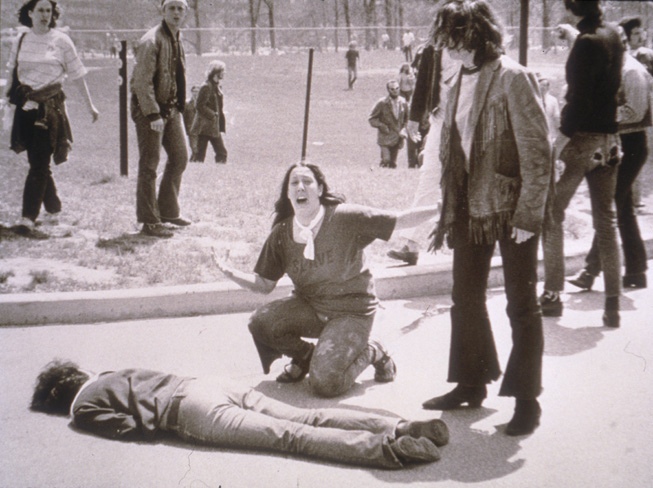Give It Away #9
The Time Bomb Is Still Ticking

When I wrote about May Day at the beginning of this week, I wasn't even cognizant of the fact that May 4th is also a very important anniversary for the civil rights movement in the USA: it is forty years to the day since the shootings at Kent State. And until I read an article by Jonah Lowenfeld, published last week in the Jewish Daily Forward, I definitely didn't know that 3 out of the 4 young people that died on that day were Jews. Well, it's one thing to consider a group of people that died for a noble cause over a century ago, Victorian-age activists who dug trenches while wearing three-piece suits, without even a soundtrack by Stravinsky. But it's another thing entirely to contemplate the martyrdom of people who wore jeans and T-shirts, listened to rock'n'roll music, and could have been my mother or father, if only they had lived long enough.
If you're too young to remember Kent State, here is a brief recapitulation of the events that took place. In 1970, US President Richard Nixon ordered the invasion of Cambodia. Students across the country were furious that Nixon had escalated the war in Southeast Asia after he had been elected on a promise to remove US troops as soon as possible. At Kent State University in Ohio, some students protested with signs and slogans, while others caused property damage to symbols of the military machine, such as an army recruiting station on campus. The Governor sent in the National Guard to occupy the campus and disperse anti-war protestors. In the melees that inevitably ensued, infantry units of armored cavalry bayoneted some students and shot 13 others, some of whom were not even protesting, but merely spectating. They were shot down from a distance of over 250 feet, clearly posing no threat to the soldiers or anyone else.
The events at Kent State occurred in a climate of political intolerance that still exists even today. When protestors paint the face of the President or Prime Minster that they oppose in the garb of an historic or present-day mass murderer, they are putting out a call for political violence. When people call their political opponents traitors to the state or fascist collaborators, they are instilling hatred in the other. And this hatred isn't hypothetical. Here in Israel, I'm sad to say that there is a long history of Zionist political violence perpetrated by Jews against Jews, from Arlozorov to the Altalena -- to say nothing of the seemingly never-ending cycle of political violence between Jews and Arabs. Unless we are willing to wade in the bloodbath of civil war, we cannot afford an escalation of political libel. And yet, to repress free speech, to stifle the voices of youth movements and political factions, is to court even more violence. As Martin Luther King, Jr. said: "When you make peaceful revolution impossible, you make violent revolution inevitable".
Today the political battleground is the Middle East, with the Left and Right facing off over the occupation of Iraq and the Palestinian situation. Add the social nitroglycerin of race and religion to the volatile mix of economic and ecologic collapse, and it looks like we're heading straight for World War Four. I've got my own biases, and it's no big secret which side of the political spectrum I want to win that debate. But if it means that the whole globe is going to go down in a big ball of flames, then maybe we all need to take a deep breath and step back from the precipice before it's a little too late. If we can see the soul, the spark, the very self in our so-called political opponents, then maybe we might even stand a chance at survival. That's why I'm thankful that the Hebrew University of Jerusalem is educating young Jews and Arabs in Israel, teaching them respect for democracy and pluralistic values. For the memories of Allison Krause, William Schroeder, Sandra Scheuer and Jeffrey Miller, let's do what we can to ensure that they can continue to do so indefinitely.

|

